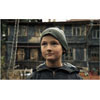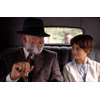 Directors: Boris Khlebnikov and Alexi Popogrebsky
Directors: Boris Khlebnikov and Alexi PopogrebskyThis Russian import from Film Movement, similar thematically to their release The Middle of The World, finds a poor, down-on-his-luck widowed father setting off across Russia with his eleven-year-old son in tow in the hopes of reaching his sister’s place in Koktebel, near the Black Sea. As the two travel without money or much in the way of luck, they meet locals and are hurt and helped by their encounters until, feeling betrayed by his dad’s falling in love, the young man (brilliantly played by Gleb Puskepalis-- wise beyond his years) sets off on his quest alone. The naturalistic cinematography and feel of the film has drawn several comparisons to the work of Terrence Malick but I also felt that fans of Ashby’s Bound for Glory, Lynch’s Straight Story and those who’ve matured on the road along with the literature of Jack Kerouac will find themselves right at home in Roads to Koktebel. The film is a quiet one with little in the way of dialogue and it’s a cinematic treat to behold wearing its most prominent influence proudly in an ending that pays homage to the famous “by the sea” finale of Truffaut’s 400 Blows, although it’s an excellent piece of film in its own right-- understated and worthwhile.


















